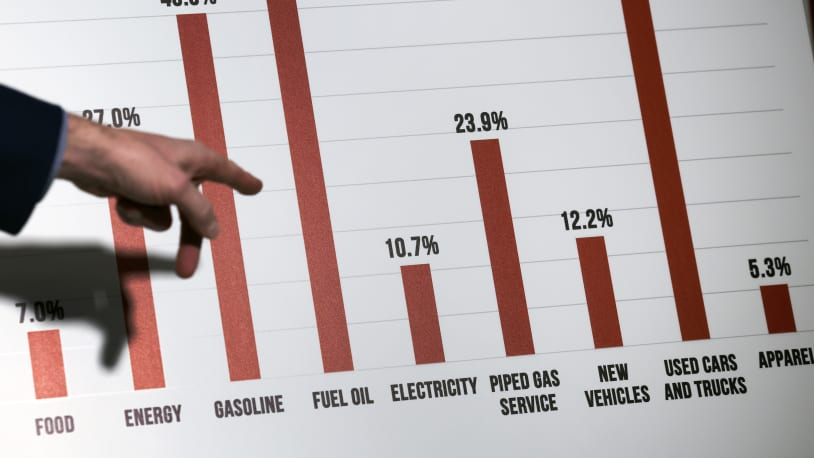
Economy: As inflation booms, does recession loom?
The smartest insight and analysis, from all perspectives, rounded up from around the web:
The time for debate is over, said the Financial Times in an editorial: The Federal Reserve must focus on getting inflation under control. Prices rose by a staggering 9.1 percent last month compared with a year ago, reaching a 40-year high. Until recently, it was possible to hope for a soft landing, a mild slowdown that would “tame the inflation problem and get the economy back to robust growth without too much pain.” Now, though, “the decision seems straightforward: raise rates rapidly.” Taking strong steps now, even if they mean a recession, is better than letting inflation turn into “a vicious cycle.” If the Fed moves too fast, “it’s easier to reverse course by loosening monetary policy than it is to bear down on an inflationary problem that has seeped into the groundwater.”
Sticker shock is everywhere, said Leslie Patton in Bloomberg. Gasoline and milk prices get most of the attention, but “the price for a pound of white bread in the U.S. hit a record $1.69 in June, a 12 percent jump from a year earlier.” The higher grocery bills are starting to produce cracks in demand, with food giants like PepsiCo and Conagra reporting declining sales volume. “I feel like the month just started, and I’ve spent $650 on groceries already,” said Brownsburg, Indiana, resident Krista Hoffman, who says she has cut out items like juice boxes and is planning more meatless meals. Inflation optimists can discount the numbers for food and energy, which tend to be very volatile, said Justin Fox, also in Bloomberg. But more worrying is that “core inflation,” which removes those prices, is “clearly accelerating.”
Hold on, said Paul Krugman in The New York Times. The Fed has already moved to contain inflation. It takes time for increases in interest rates to affect inflation — more than the “scant three to four months” we’ve had since the central bank started raising interest rates in March. You’d think that the June inflation report would have sent the markets into a tumble. Markets, though, largely “shrugged off” the news. Why? Because the markets see signs that inflation is coming to heel that haven’t made it into the headline data points, and the message they are sending is “Don’t panic.” Financial markets are saying that “inflation is not, in fact, out of control, though the pain many consumers are feeling right now is.” The biggest danger may actually be that the Fed will let itself be “bullied into hiking rates too much and produce a gratuitous recession.”
How bad are things really? asked Derek Thompson in The Atlantic. A highly cited University of Michigan index found that Americans’ outlook on the economy fell to the lowest point in 70 years. Yet, many people “seem to be having a grand old time. Leisure travel is so strong that airports can barely keep up.” Restaurants are packed, and hotel occupancy is back to normal. We seem to have adopted an “everything is terrible, but I’m fine” mentality. That might mean that things are better than the numbers show. Or — much worse — that Americans “intuitively sense that a recession is near, so they’re getting in their last thrills.
This article was first published in the latest issue of The Week magazine. If you want to read more like it, you can try six risk-free issues of the magazine here.
The smartest insight and analysis, from all perspectives, rounded up from around the web: The time for debate is over, said the Financial Times in an editorial: The Federal Reserve must focus on getting inflation under control. Prices rose by a staggering 9.1 percent last month compared with a year ago, reaching a 40-year high.…
The smartest insight and analysis, from all perspectives, rounded up from around the web: The time for debate is over, said the Financial Times in an editorial: The Federal Reserve must focus on getting inflation under control. Prices rose by a staggering 9.1 percent last month compared with a year ago, reaching a 40-year high.…